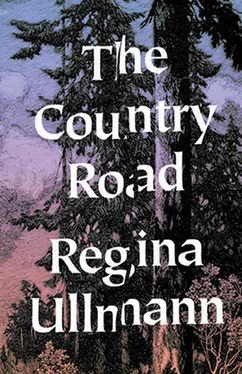But her husband went to the tavern. And in the morning he sat in that café. What had his wife ever done to him? She hadn’t married him, he had married her. And besides, he had come into a nice bit of money with the transfer of this profitable tenement building. And they practically lived there alone. Why did he have to subject her to this slow death? His name was Michael Minster. Was he perhaps the stone house of the devil? Why did he live on, unpunished?
He had not spoken a single warm word to the sick woman. Strangers, one still a child, had cared for her, as if she were not worth the effort of a whole, grown person. It was this child who had placed the candle in her hands as death drew near. But he had shut her eyes in the end.
It was with this guilt that he now sat in the café, walked past the shop windows, took in the landscapes and heard the parade marches and waltzes. Where had God’s love been when this man was created. And yet there are people much more callous and evil than he. And many, many more like him, of all varieties. And who can be sure that he himself has not treated his fellow men in such a way at times.
For the ultimate justice does not ask if these times lasted only a moment, or an eternity. Or had men merely invented and created these punishments for themselves? Could a man be his own tribunal, even as others thought him beyond reach? Or was he truly beyond reach? For the childlike girl still comes to the old man’s house, still cleans and tidies the rooms, in an impersonal way, with her mind on her own future that is yet to come. She heats the room for him, brings an apple along for herself as a child might, as if it were a ball, and polishes it on her apron to a fiery red. One spring day she even sets freshly picked anemones on the table. But only because she has found so many, and because there are vases there that can hold them, and freshly cleaned rooms in which these flowers can stand.
For these rooms have long since returned from their journey to the land of death. Only once does this thought occur to the girl, and her face betrays foreboding and a general fear. But even then it is only existence itself that has revealingly opened her eyes. For life seems to simply, impassively set down its seasons in this large gray house, be they glowing hot or growing chill. The clock turns inaudibly beneath the glass dome; the old man seems to have reached a point at which he no longer even wants to walk through the streets, or to flip through the newspapers in the little café. In short, he seems to have arrived at the pinnacle of his solitude. But this is in the autumn. The old man has contracted a cold, and he regards his single street from his armchair. She is coming. The café woman is coming, she herself, larger than that room. And in the face of this fate, he simply looks on at first, not knowing if it will pass and leave him only with an endless sense of fear, or if this fate will grab him with its real hands, with its larger-than-life gestures, as if this were the way it was meant to be, as if it were like this for everyone in the world, but then again only for him alone. And yet he had laid out his life for himself, nothing in it had ever happened by chance. He had been a god of his own destiny. And now he felt that he had even come to fear himself. And he began to feel his own bony frame, the way that one suddenly recognizes death. But life is still there too, so seemingly harmless, and it takes hold of him in the most unremarkable forms, for what is there to fear if that café woman comes to visit — that plump woman, full of cares in her own way, but also mighty — if she comes to ask after his well-being? For it really has been too long since he was in her little shop, that old man there.
And the same thing returns again and again, as if there were only one life in great-grandmother, grandmother, mother, in grandfather, father, and children.
Oh how bright it would be in us if one day we could work this off, if we could begin. .
When the strawberries ripen in the woods and gardens and spread their many-colored fragrance along the currents of the air, when we feel childhood and the morning of a mother, of the many working people all around us in the world, the city with its greening gardens surging like waves around its walls, when we feel how even all the voiceless things are owners and bearers of life when the time is right, then we grow more confident, more comforting, and not for nothing. We are young ourselves, and we share in the beauty of a June day, we are deep within it like a blackbird’s song. But because we can have all this without sharing in the effort of existence, because we are not prepared to fall from the air like birds, because we need a shelter all the same, and cannot merely view the earth from above like a relief, there is danger even in such beauty. Suddenly we are no longer there as people for the people around us, the path of our fate has vanished like a dead man’s. . We live outside of our being, and one day we are found like a plant, slowly rotting into the earth.
Then clarity must help us, if it comes at the right time, that clarity that many call love, the evergreen landscape of our own hearts.
The strawberries were ripening under their dark-haired leaves; it brought to mind an old picture in our house, with its view from the palace and the palace garden of the chaste Susanna at her bath. .
There were hands that grew lecherous at the sight, like those two old men. They were prepared to risk dishonor in the eyes of the whole world: and yet they did it. .
But when the one who is defiled is a garden, then only the deep blue June sky is the judge, and only the seemingly silent road is the world, the gardens with their gray stone enclosures, with their silver-green shrubbery, with the arabesques of shadows on the gray faces of the houses.
A narrow garden wrapped around the house; the type of garden little people keep, only there to be looked at. But not just by those passing in the street outside; inside, too, bright blossoms bore ripening pears, though it was hard to say for whom.
First of all, there was the man who owned the house and garden, but he didn’t live in the house or in the garden, he lived up on the mountain, and no one had ever seen him harvesting his fruit. And when he was working there during the day — for the house in which we lived was just his factory building — when he looked down from his window, everything jumped: his tenants’ children and the butterflies and the butterflies’ shadows and a bird that swooped down with a chirp to catch a small caterpillar. And the pears and red currants were not yet ripe. And between the bright days there was always a night, and no one knew if it was the birds or the unguarded minds of children that so quickly caught sight of the yellow and red colors and shapes amidst the green foliage, and saw the garden only in its berries. Or was it a thief who came in the night; an outright thief, which is just what he wished to be called, for what would have become of him if someone had recognized him and called him by his proper name? No, no one wanted to catch a man like that. They would much rather strew a bit of salt on the little birds’ tails during the day.
Those were the thoughts of the factory owner and boss as he looked out the window at the garden before the harvest, and his thoughts were so mild that he was content with them.
Yet it’s easy to be benevolent on a whim like that. Such a whim won’t take you at your word. You can go home from work to a cozy table feeling pleased with yourself for being a just man. Indeed, it seems that such a good deed of omission, lying out in the sun like an ostrich egg, has a way of inspiring particular confidence. You laugh in silence. The whole world turns to gold when you touch it.
Читать дальше












